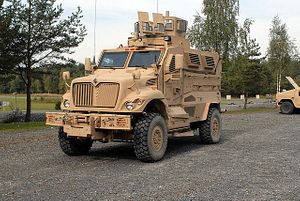Earlier this week, Eurasianet’s Joshua Kucera flagged an interesting, largely overlooked bit in last month’s U.S. congressional hearing on civil and political rights in Central Asia. Speaking before the Tom Lantos Human Rights Commission, Deputy Assistant Secretary of State for Central Asia Dan Rosenblum took a break from discussing Washington’s fledgling, floundering focus on human rights in the region to discuss a move with which his name has become synonymous: America’s decision to give some 300 Mine-Resistant Ambush Protected (MRAP) vehicles to the Uzbek regime, the largest single military donation the U.S. has ever offered the region.
The fact that the donation benefited one of the most heinous regimes extant, from a human rights standpoint – and came nearly a decade after the Uzbek regime gunned down hundreds of civilians at Andijan – was not lost on the committee’s chairman, Rep. Jim McGovern of Massachusetts. “Could somebody explain the rationale for the initiative, given Uzbekistan’s human rights record?” McGovern asked. (It remains worth noting that the vehicles, unlike what others have claimed, are not simply excess materiel from Afghanistan, but are being shipped to Uzbekistan from other locales.)
Instead of focusing on concerns about the Uzbek regime’s potential usage of military vehicles against civilians, Rosenblum defended the donation. “We determined that [the donation] would help to improve Uzbekistan’s border security and its ability to carry out counterterrorism and counternarcotics operations. And because these were deemed to be purely defensive vehicles, purely defensive equipment,” he said. “They will be used only by Ministry of Defense personnel, internal security or police forces are not authorized to use the equipment, and the equipment is subject to end use restrictions and regular monitoring by U.S. personnel on the ground.” Rosenblum went on to discuss how U.S. personnel would continue monitoring the vehicles’ usage “to ensure compliance with human rights concerns.”
There’s not anything necessarily surprising within Rosenblum’s response; indeed, it mirrors much of what he’s said prior in defending the move. Nonetheless, it’s worth parsing some of his claims. Firstly, much as we’ve witnessed with the U.S. debate on sending further arms to Ukraine, the notion of a “purely defensive” mode of weaponry remains something of a linguistic fallacy – especially in the hands of a regime involved in the Andijan massacre. Second, the claim that the MRAPs could be used in “counterterrorism and counternarcotics” operations both plays to overblown fears of Afghan and ISIS spillover, and provides the wrong tools for the wrong people. Rather than offer the largest military donation to date to combat “counternarcotics,” the U.S. would be far better off, say, looking to step up anti-corruption efforts.
Lastly, Rosenblum’s belief that U.S. personnel would somehow manage to “vet … the actual units” before usage remains, at the best, concerning. Yes, Washington may be able to find agreement to such demand with Tashkent. But it’s not as if the U.S. managed to stall usage of (presumably) American equipment in anti-civilian crackdowns in Kyrgyzstan or Kazakhstan – regimes far less prone to massacres than the regime in Uzbekistan. To his credit, McGovern pushed back at Rosenblum’s claims that the U.S. could somehow “vet” the “defensive” vehicles’ usage: “I appreciate all the words that there is going to be due diligence and proper oversight and all that stuff, but it just doesn’t strike me as appropriate that we would do something like that.”
To Washington’s credit, the State Department’s interactions viz. Uzbekistan haven’t all helped the regime in Tashkent continue cracking down on civilian protest. American Ambassador to Uzbekistan Pamela Spratlen, one of the most seasoned, well-respected diplomats in the region, recently took time to meet with Elena Urlaeva, a civil rights activist often tagged as “the bravest woman in Uzbekistan.” Spratlen’s move helped tamp down some of the mounting criticism Washington has faced for its decision regarding the MRAP donation. Unfortunately, despite Spratlen’s best efforts, the optics of her visit pale in comparison to Rosenblum’s continuing defense of one of the most odious moves Washington has recently made in the region. It’s an open secret the U.S. lacks a wholesale policy for Central Asia. But when your most tangible move comes in the form of massive, and altogether unnecessary, military donations to a regime that boils its dissidents alive, no manner of meeting with activists is going to ameliorate your reputation in the region.

































